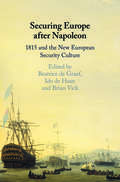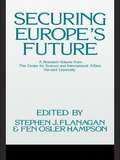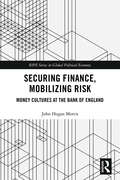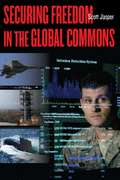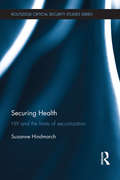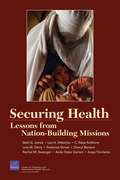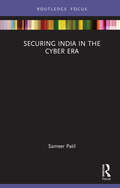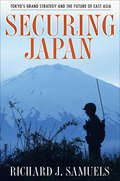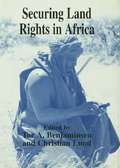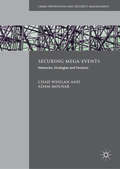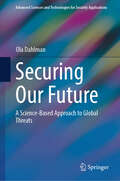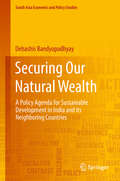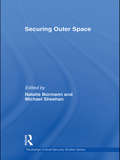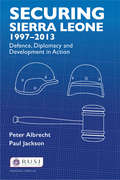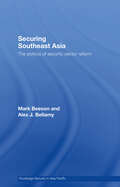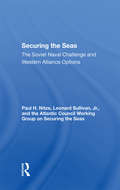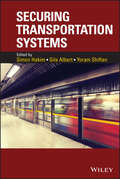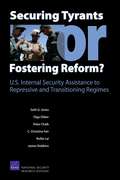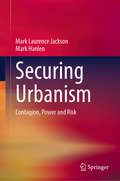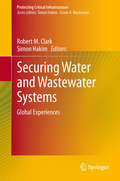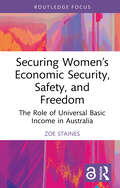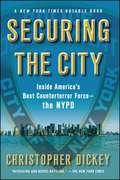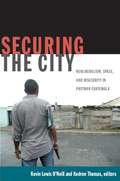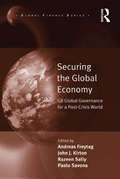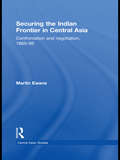- Table View
- List View
Securing Europe after Napoleon: 1815 and the New European Security Culture
by Beatrice De Graaf Ido De Haan Brian VickAfter the French Revolution and the Napoleonic Wars, the leaders of Europe at the Congress of Vienna aimed to establish a new balance of power. The settlement established in 1815 ushered in the emergence of a genuinely European security culture. In this volume, leading historians offer new insights into the military cooperation, ambassadorial conferences, transnational police networks, and international commissions that helped produce stability. They delve into the lives of diplomats, ministers, police officers and bankers, and many others who were concerned with peace and security on and beyond the European continent. This volume is a crucial contribution to the debates on securitisation and security cultures emerging in response to threats to the international order.
Securing Europe's Future: A Research Volume From The Center Of Science And International Affairs, Harvard University (Routledge Library Editions: Cold War Security Studies #42)
by Stephen Flanagan Fen Osler HampsonThis book analyses a number of emerging, enduring and neglected issues that will affect European security and the stability of the Atlantic Alliance in the near future.
Securing Finance, Mobilizing Risk: Money Cultures at the Bank of England (RIPE Series in Global Political Economy)
by John MorrisDrawing on the history of modern finance, as well as the sociology of money and risk, this book examines how cultural understandings of finance have contributed to the increased capitalization of the UK financial system following the Global Financial Crisis. Providing both a geographically-inflected analysis and re-appraisal of the concept of performativity, it demonstrates that financial risk management has a spatiality that helps to inform understandings and imaginaries of the risks associated with money and finance. The book traces the development of understandings of risk at the Bank of England, with an analysis that spans some 1,000 reports, documents and speeches alongside elite interviews with past and present employees at the central bank. The author argues that the Bank has moved from a relatively broad-brush approach to the risks being managed in the financial sector, to a greater preoccupation with the understanding and mapping of the mobilization of financial risk. The study of financial practices from a critical social sciences and humanities perspective has grown rapidly since the Global Financial Crisis and this book will be of interest to multiple subject areas including IPE, economic geography, sociology of finance and critical security studies.
Securing Freedom in the Global Commons
by Scott JasperThe new millennium has brought with it an ever-expanding range of threats to global security: from cyber attacks to blue-water piracy to provocative missile tests. Now, more than ever then, national security and prosperity depend on the safekeeping of a global system of mutually supporting networks of commerce, communication, and governance. The global commons-outer space, international waters, international airspace, and cyberspace-are assets outside of national jurisdiction that serve as essential conduits for these networks, facilitating the free flow of trade, finance, information, people, and technology. These commons also comprise much of the international security environment, enabling the physical and virtual movement and operations of allied forces. Securing freedom of use of the global commons is therefore fundamental to safeguarding the global system. Unfortunately, the fact that civil and military operations in the commons are inherently interwoven and technically interdependent makes them susceptible to intrusion. This intrinsic vulnerability confronts the international defense community with profound challenges in preserving access to the commons while countering elemental and systemic threats to the international order from both state and non-state actors. In response, the authors of this volume-a team of distinguished academics and international security practitioners-describe the military-operational requirements for securing freedom of action in the commons. Collaborating from diverse perspectives, they examine initiatives and offer frameworks that are designed to minimize vulnerabilities and preserve advantages, while recognizing that global security must be underscored by international cooperation and agreements. The book is written for security professionals, policy makers, policy analysts, military officers in professional military education programs, students of security studies and international relations, and anyone wishing to understand the challenges we face to our use of the global commons.
Securing Health: HIV and the Limits of Securitization (Routledge Critical Security Studies)
by Suzanne HindmarchThis book offers a critical inquiry into the framing of health and disease as a security issue. In particular, the book examines what happens in the United Nations when the ostensibly ‘low’ politics of global health meet the ‘high’ politics of security, and when the logic of security comes to shape global health initiatives. It offers a critical re-assessment of efforts in the United Nations system to position HIV as a security threat with the hope that this would attract greater attention and resources for the global HIV response. The book advances securitization theory by presenting a new framework for studying HIV as a policy process, uniting several theoretical strands into a single, powerful model for empirical application. It uses this model to draw attention to important, understudied aspects of HIV securitization, including the role played by discourses about Africa, and the evolution of ideas about HIV and security as actors learned over time. On the basis of this empirically grounded assessment of how securitization works as a theory and a political strategy, the book suggests that securitization is inherently limited, and perhaps dangerous, as a strategy for ‘securing’ social change. This book will be of much interest to students of critical security studies, global health, development studies, and IR in general.
Securing Health: Lessons from Nation-building Operations
by Seth G. Jones Lois M. Davis Federico Girosi Lee H. Hilborne C. Ross AnthonyRAND researchers analyzed the health components of seven post-World War II nation-building efforts conducted after major conflicts--Germany, Japan, Somalia, Haiti, Kosovo, Afghanistan, Iraq--and found that two factors are correlated with successful health outcomes: planning and coordination, and infrastructure and resources.
Securing India in the Cyber Era (The Gateway House Guide to India in the 2020s)
by Sameer PatilThis book explores the geopolitics of the global cyber space to analyse India’s cyber security landscape. As conflicts go more online, nation-states are manipulating the cyber space to exploit each other’s dependence on information, communication, and digital technologies. All the major powers have dedicated cyber units to breach computer networks, harvest sensitive data and proprietary information, and disrupt critical national infrastructure operations The volume reviews threats to Indian computer networks, analyses the country’s policy responses to these threats, and suggests comprehensive measures to build resilience in the system. India constitutes the second largest internet user base in the world, and this expansion of the user base also saw an accompanying rise in cybercrimes. The book discusses how the country can protect this user base, the data-dependent critical infrastructure, build resilient digital payment systems, and answer the challenges of the dark net. It also explores India’s cyber diplomacy, as an emerging economy with a large IT industry and a well-established technological base. Topical and lucid, this book as part of The Gateway House Guide to India in the 2020s series will be of interest to scholars and researchers of cyber security, digital diplomacy, foreign policy, international relations, geopolitics, strategic affairs, defence studies, South Asian politics, and international politics.
Securing Japan: Tokyo's Grand Strategy and the Future of East Asia (Cornell Studies in Security Affairs)
by Richard J. SamuelsFor the past sixty years, the U.S. government has assumed that Japan's security policies would reinforce American interests in Asia. The political and military profile of Asia is changing rapidly, however. Korea's nuclear program, China's rise, and the relative decline of U.S. power have commanded strategic review in Tokyo just as these matters have in Washington. What is the next step for Japan's security policy? Will confluence with U.S. interests—and the alliance—survive intact? Will the policy be transformed? Or will Japan become more autonomous?Richard J. Samuels demonstrates that over the last decade, a revisionist group of Japanese policymakers has consolidated power. The Koizumi government of the early 2000s took bold steps to position Japan's military to play a global security role. It left its successor, the Abe government, to further define and legitimate Japan's new grand strategy, a project well under way-and vigorously contested both at home and in the region. Securing Japan begins by tracing the history of Japan's grand strategy—from the Meiji rulers, who recognized the intimate connection between economic success and military advance, to the Konoye consensus that led to Japan's defeat in World War II and the postwar compact with the United States. Samuels shows how the ideological connections across these wars and agreements help explain today's debate. He then explores Japan's recent strategic choices, arguing that Japan will ultimately strike a balance between national strength and national autonomy, a position that will allow it to exist securely without being either too dependent on the United States or too vulnerable to threats from China. Samuels's insights into Japanese history, society, and politics have been honed over a distinguished career and enriched by interviews with policymakers and original archival research. Securing Japan is a definitive assessment of Japanese security policy and its implications for the future of East Asia.
Securing Land Rights in Africa
by Christian Lund Tor A. BenjaminsenThis collection of research papers from across the African continent illustrates the complex and ever-changing rules of the land tenure game, and how government legislation and reform (formalization) interact with local innovations (informalization) to form land tenure systems.
Securing Mega-Events: Networks, Strategies and Tensions (Crime Prevention and Security Management)
by Chad Whelan Adam MolnarMega-events such as the Olympic Games, World Cup finals and international political summits are occasions of almost unparalleled economic, political and social significance for host nations and cities. The scale and scope of mega-event security has continued to grow enormously since 11 September 2001, consistently involving the largest policing and security operations for event hosts outside of wartime. This book is the first to focus exclusively on the organisational dynamics underpinning the design and delivery of mega-event security. Using the G20 Summit in Brisbane, Australia in November 2014 as a case study, in conjunction with comparisons with events such as the Toronto 2010 G20, the authors engage in a comprehensive assessment of the networks, strategies and tensions involved in mega-event security. By drawing on the insightful experiences of those responsible for securing the Brisbane 2014 G20, the authors look behind-the-scenes to capture the complexity of mega-event security. The authors argue that such an approach is essential to better appreciate how different conceptions of security, ways of thinking and acting, impact a range of security ideals and outcomes.
Securing Our Future: A Science-Based Approach to Global Threats (Advanced Sciences and Technologies for Security Applications)
by Ola DahlmanIn an era marked by escalating global crises—climate change, cyber threats, pandemics, and nuclear weapons proliferation—this book introduces a science-based approach to security and global threats. It underscores the necessity of interdisciplinary science and technology to ensure that decisions and actions are grounded in knowledge. This vision seeks to inspire, promote, and facilitate collaboration across all sectors of global society. Building resilient societies and effectively addressing global threats will require substantial resources. Can we afford to save the Earth? Can we afford not to? Four Key Elements: A Science-Based Approach to Security and Global Threats: The book is structured around two key chapters: an opening chapter that outlines this new vision, and a concluding chapter that reflects on how to translate that vision into actionable steps. Evolution of Earth and Society: A review of the development of our planet leading to modern society, with a discussion on global demography and the economy—critical components of global security and resilience. Key Global Communities: An introduction to five global communities—states, cities, the business and scientific communities, and civil society. It examines how each can contribute to building security and assesses their vulnerabilities to various threats. Major Human-Created Threats: A discussion of five large-scale threats created by human activity or arising from human interaction with nature: global warming, natural disasters, biopandemics, nuclear weapons, and cyber threats. This book serves as a call for informed, collaborative action to address the pressing global challenges of our time.
Securing Our Natural Wealth: A Policy Agenda for Sustainable Development in India and for Its Neighboring Countries (South Asia Economic and Policy Studies)
by Debashis BandyopadhyayThis book explores various aspects of Intellectual Property Rights (IPR) regimes with regard to plant-variety protection and farmers’ rights; traditional knowledge; geographical indications, genetically modified crops; and access to genetic resources within the broad ambit of Trade-Related Aspects of Intellectual Property Rights (TRIPS), the Convention of Biological Diversity and other treaties/protocols. Enumerating the governance provisions for India and some of its neighboring countries, including Nepal, Sri Lanka, Bangladesh, Bhutan, Thailand and Myanmar, the book synthesizes a policy agenda to drive sustainable development. Further, it assesses and interprets the status quo, and discusses key issues and implications. By comparing various governance frameworks in South Asian countries, it attempts to bridge policy issues concerning development, IPR and international studies.
Securing Outer Space: International Relations Theory and the Politics of Space (Routledge Critical Security Studies)
by Natalie Bormann Michael SheehanThe challenges that space poses for political theory are profound. Yet until now, the exploration and utilization of space has generally reflected – but not challenged – the political patterns and impulses which characterized twentieth-century politics and International Relations. This edited volume analyses a number of controversial policies, and contentious strategies which have promoted space activities under the rubric of exploration and innovation, militarization and weaponization, colonization and commercialization. It places these policies and strategies in broader theoretical perspective in two key ways. Firstly, it engages in a reading of the discourses of space activities: exposing their meaning-producing practices; uncovering the narratives which convey certain space strategies as desirable, inevitable and seamless. Secondly, the essays suggest ways of understanding, and critically engaging with, the effects of particular space policies. The essays here seek to ‘bring back space’ into the realm of International Relations discourse, from which it has been largely removed, marginalized and silenced. The various chapters do this by highlighting how activities in outer space are always connected to earth-bound practices and performances of the every day. Securing Outer Space will be of great interest to students of space power, critical security studies and IR theory.
Securing Sierra Leone, 1997-2013: Defence, Diplomacy and Development in Action (Whitehall Papers)
by Paul Jackson Peter AlbrechtBetween 1991 and 2002, Sierra Leone was wracked by a devastating civil war and the complete collapse of state institutions. Since then, however, the UK’s contribution to post-war reconstruction has been widely held up as an example of successful stabilisation and state-building – particularly of the country’s security and justice institutions. Securing Sierra Leone, 1997–2013 examines how the process of state-building through security-sector reform developed in Sierra Leone, and the impact of this experience on international conceptualisations of such reform as well as on international interventions more broadly. The study is the most detailed of its kind, based on a comprehensive analysis of UK engagement in Sierra Leone between 1997 and 2013, including a host of first-hand accounts from key local and international actors. This monograph shows why the UK intervention in Sierra Leone has been a relative success. However, it also questions the sustainability of state-building efforts that are driven by concepts of the liberal state. In Sierra Leone, critical challenges remain, not least in the combination of a particular vision of what a state should look like and the unrealistic expectations of progress on the part of the international community.
Securing Southeast Asia: The Politics of Security Sector Reform (Routledge Security in Asia Pacific Series #Vol. 6)
by Mark Beeson Alex BellamyThis book uniquely applies the security reform agenda to Southeast Asia. It investigates recent developments in civil-military relations in the region, looking in particular at the impact and utility of the agenda on the region and assessing whether it is likely to help make the region more stable and less prone to military interventions. It provides an historical overview of the region’s civil-military relations and goes on to explore the dynamics of civil-military relations within the context of the security sector reform framework, focusing on the experiences of four of the region’s militaries: Malaysia, Thailand, the Philippines and Indonesia. It argues that although regional militaries have not necessarily followed a ‘Western’ model, significant developments have occurred that are broadly in keeping with the security sector reform agenda, and which suggests that the prospects for stable civil-military relations are brighter than some sceptics believe.
Securing The Seas: The Soviet Naval Challenge And Western Alliance Options
by Paul H NitzeThis book is the effort of experts brought together by the Atlantic Council to analyze the capabilities of the Western Alliance to defend sea lines of communication under various conditions of peace, tension, and war. It reviews the way in which Soviet naval forces have been used in the Alliance.
Securing Transportation Systems
by Simon Hakim Gila Albert Yoram ShiftanThis book focuses on how to protect our transportation systems including airports and airlines, water ports, highways, tunnels and bridges, rail and mass transit, and how to better plan evacuation when severe disasters occur. These infrastructures may face various threats, namely biological, chemical, nuclear (dirty bombs), cyber, and natural disaster. The book presents the "State of the Art" efforts to improve technological and managerial security measures against terrorism as well as during and after natural disasters. It contains insights and recommendations from a group of international recognized experts and provides guidelines for policy and public decision making including suggestions for IT companies for possible new products.
Securing Tyrants or Fostering Reform? U.S. Internal Security Assistance to Repressive and Transitioning Regimes
by Olga Oliker Peter Chalk Seth G. Jones Rollie Lal C. Christine FairThis study examines the results of U.S. assistance to the internal security forces of four repressive states: El Salvador, Uzbekistan, Afghanistan, and Pakistan. Efforts to improve the security, human rights, and accountability of security forces appear more likely to succeed in states transitioning from repressive to democratic systems. In addition, several factors are critical for success: the duration of assistance, viability of the justice system, and support and buy-in from the local government (including key ministries).
Securing Urbanism: Contagion, Power and Risk
by Mark Laurence Jackson Mark HanlenThis book is concerned with developing an in-depth understanding of contemporary political and spatial analyses of cities. In the three-part development of the book’s overall argument or premise, the reader is taken in Part I through a range of contemporary critical and political understandings of urban securitizing. This is followed by an historical urban landscape of emerging liberalism and neo-liberalism, in nineteenth-century Britain and twentieth-century United States, respectively. These case-study historical chapters enable the introduction of key political issues that are more critically assayed in Parts II and III. With Part II, the reader is introduced in depth to a series of spatial analyses undertaken by Michel Foucault that have been crucial for especially late-twentieth and twenty-first century urban theory and political geography. With Part III the full ramifications of a paradigmatic shift are explored at the level of rethinking territory, population and design. This book is timely and useful for readers who want to develop a stronger understanding of what the book’s researchers term a new political paradigm in urban planning, one ultimately governed by global economic forces that define the end of probability.
Securing Water and Wastewater Systems
by Simon Hakim Robert M. ClarkUrban water and wastewater systems have an inherent vulnerability to both manmade and natural threats and disasters including droughts, earthquakes and terrorist attacks. It is well established that natural disasters including major storms, such as hurricanes and flooding, can effect water supply security and integrity. Earthquakes and terrorist attacks have many characteristics in common because they are almost impossible to predict and can cause major devastation and confusion. Terrorism is also a major threat to water security and recent attention has turned to the potential that these attacks have for disrupting urban water supplies. There is a need to introduce the related concept of Integrated Water Resources Management which emphasizes linkages between land-use change and hydrological systems, between ecosystems and human health, and between political and scientific aspects of water management. An expanded water security agenda should include a conceptual focus on vulnerability, risk, and resilience; an emphasis on threats, shocks, and tipping points; and a related emphasis on adaptive management given limited predictability. Internationally, concerns about water have often taken a different focus and there is also a growing awareness, including in the US, that water security should include issues related to quantity, climate change, and biodiversity impacts, in addition to terrorism. This presents contributions from a group of internationally recognized experts that attempt to address the four areas listed above and includes suggestions as to how to deal with related problems. It also addresses the new and potentially growing issue of cyber attacks against water and waste water infrastructure including descriptions of actual attacks, making it of interest to scholars and policy-makers concerned with protecting the water supply.
Securing Women’s Economic Security, Safety, and Freedom: The Role of Universal Basic Income in Australia
by Zoe StainesUniversal basic income (UBI) as a policy measure for supporting economic security has attracted worldwide attention. This book contributes to the discussion by focusing on UBI’s potential impacts for women, including women of colour and First Nations women.Utilizing a “scenario interviewing” approach, the author worked with 26 diverse Australian women to imagine the potential implications of UBI for their own lives, as well as for women more broadly. The women talked about a range of possible impacts including poverty reduction, economic security, improved autonomy, and freedom from violence, which are sorted into overarching themes and chapters. Integrating these women’s narratives into the key arguments for and against UBI, this book provides a robust and readable introduction to relevant literature.This book is suitable for a wide audience including scholars and students across the social sciences, as well as policymakers.
Securing the City: Inside America's Best Counterterror Force - The NYPD
by Christopher DickeyThe NYPD is the best and most ambitious anti-terror operation in the world. Its seat-of-the-pants intelligence is the gold standard for all others.
Securing the City: Neoliberalism, Space, and Insecurity in Postwar Guatemala
by Kevin Lewis O'Neil Kedron ThomasUnprecedented crime rates have made Guatemala City one of the most dangerous cities in the world. Following a peace process that ended Central America's longest and bloodiest civil war and impelled the transition from a state-centric economy to the global free market, Guatemala's neoliberal moment is now strikingly evident in the practices and politics of security. Postwar violence has not prompted public debates about the conditions that permit transnational gangs, drug cartels, and organized crime to thrive. Instead, the dominant reaction to crime has been the cultural promulgation of fear and the privatization of what would otherwise be the state's responsibility to secure the city. This collection of essays, the first comparative study of urban Guatemala, explores these neoliberal efforts at security. Contributing to the anthropology of space and urban studies, this book brings together anthropologists and historians to examine how postwar violence and responses to it are reconfiguring urban space, transforming the relationship between city and country, and exacerbating deeply rooted structures of inequality and ethnic discrimination. Contributors. Peter Benson, Manuela Camus, Avery Dickins de Girn, Edward F. Fischer, Deborah Levenson, Thomas Offit, Kevin Lewis O'Neill, Kedron Thomas, Rodrigo Jos Vliz
Securing the Global Economy: G8 Global Governance for a Post-Crisis World (Global Finance Ser.)
by Andreas Freytag Paolo SavonaSecuring the Global Economy explores how and why the G8 and other institutions of global governance deal with increasingly comprehensive and complex economic-security connections. These connections are explored from an interdisciplinary perspective, with economists, political scientists and those in the policy world bringing their insights to bear. Moreover, this volume explores this economic-security connection from a constitutional or institutional perspective. In a classical liberal spirit, it is concerned with the organizing principles of a liberal international economic order and the framework of rules that enables it to survive and flourish. Security issues, national trade policies, the multilateral trade system and the detailed technical issues they subsume are analysed from this higher vantage point. This is thus a work about global governance as a whole and at its core, rather than a problem-solving manual for a few of the issues now at centre stage. Furthermore, it applies this larger vision to the current G8 and global economic-security agenda to generate a set of policy recommendations about how the global community, through and outside the G8, can better cope with the complex interconnected challenges it now confronts. Its innovative policy recommendations are especially timely when the recent global financial crisis, economic recession and fragile recovery place great strains on the liberal economic order, while new challenges from Iran, ongoing terrorist threats and corruption make this security-economic connection critically important.
Securing the Indian Frontier in Central Asia: Confrontation and Negotiation, 1865-1895 (Central Asian Studies)
by Martin EwansThe three decades between 1865 and 1895 marked a particularly contentious period in the relationship between Britain and Russia in Central Asia, which more than once brought them to the verge of war. Moderates tried to settle the problem by the negotiation of ‘neutral zones’, or firm boundaries, but the issue was complicated by misreading of intentions, much internal confusion and dispute, and considerable ignorance of the geographical and geopolitical factors involved. This careful and detailed analysis examines the strategic thinking and diplomatic discourse which underlay the whole period, and in particular of the succession of efforts to establish a frontier, which eventually brought the period to a close without a major confrontation being provoked. Based on relevant records in the PRO and the British Library, as well as private papers, press comment, parliamentary debates and other contemporary accounts, Sir Martin Ewans provides a ‘history of thought' of this crucial period in Central Asia. He provides an insight into the manner in which issues of war and peace were handled in the 19th Century and a fascinating case study of a great power relationship prior to the First World War. An important contribution to the study of Asian history, Tsarist Russia, imperial history and the history of British India, this book will also be of interest in India and Pakistan as a study of the events that led to the definition and consolidation of their northern frontiers.
